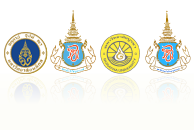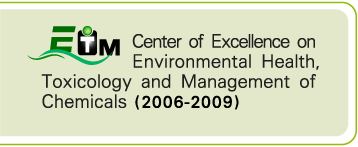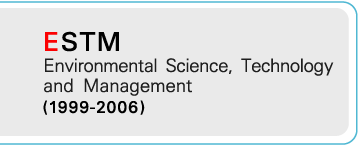Curriculum
Curriculum : The curriculum consists of three type of courses: prerequisite, core and elective.
The core consists of courses in basic toxicology, environmental management, and waste technology. This is supported by courses to expand the basic training and promote specialization.
This curriculum is designed to support both Master of Science and Doctor of Philosophy degree programs. The extent to which laboratory work and thesis / dissertation research is involved will be commensurate with the needs of the students and the resources of the institution.
Prerequisites:
- Biochemistry
- Statistics
- Biology or Life Sciences
- Integrated Life Sciences (3)
Core Courses: (23 credits)
- Principles of Toxicology (3)
- Principles of Environmental Management (3)
- Environmental Toxicology (2)
- Health/Environmental Risk and Impact Assessment (3)
- Sampling Design (+ laboratory) (2)
- Industrial Waste Abatement and Management (3)
- Health, Development and Environment (2)
- Hazardous Waste Technology and Management (2)
- Environmental Economics (3)
Elective Courses: (16 credits)
- Environmental Microbiology (+ laboratory) (2)
- Advanced Microbial Technology (+ laboratory) (3)
- Molecular Biology of Environmental Stress (1)
- Seminar in Toxicology (1)
- Seminar in Environmental Biotechnology (1)
- Environmental Chemistry (+ laboratory) (3)
- Sanitation and Health (3)
- Selected Topics;
- Bioengineering and Environmental Health (2)
(Joint Massachusetts Institute of Technology-ETTM program course) - Toxicology of Pesticides and Industrial Chemicals; Occupational Health and Safety (2)
- Biotechnology for Toxic Assessment and Control (2)
- Environmental Immunotoxicology and Reproductive Toxicology (2)
- Detection of Environmental Pollution (3)
A wide range of more specialized courses relevant to ETTM students are offered by various academic fields of study at AIT such as:
- Agricultural and Aquatic Systems Field of Study – provides a wide range of courses in agriculture, coastal aquaculture, aquaculture water quality management.
- Bioprocess Technology Field of Study – offers courses on fermentation, enzyme and cell catalysis, biochemical and physical separation techniques and provides extensive laboratory facilities.
- Environmental Engineering and Management Field of Study – offers courses in industrial wastewater pollution and control, toxic materials in ecosystems, waste reuse and recycling, design of water supply and wastewater system, water quality analysis and provides environmental engineering laboratory facilities and a wide range of courses related to environmental planning and management.
- Energy Technology Field of Study – offers a comprehensive range of courses related to energy balance, planning and policy, environmental policy and management of energy systems, renewable energy sources and energy conservation.
- Water Supply, Drainage and Sewage Engineering Field of Study – offers courses in water resource systems, flood control and drainage systems, municipal sewage and sludge management etc.
 Center of Excellence on Environmental Health and Toxicology (EHT)
Center of Excellence on Environmental Health and Toxicology (EHT)











